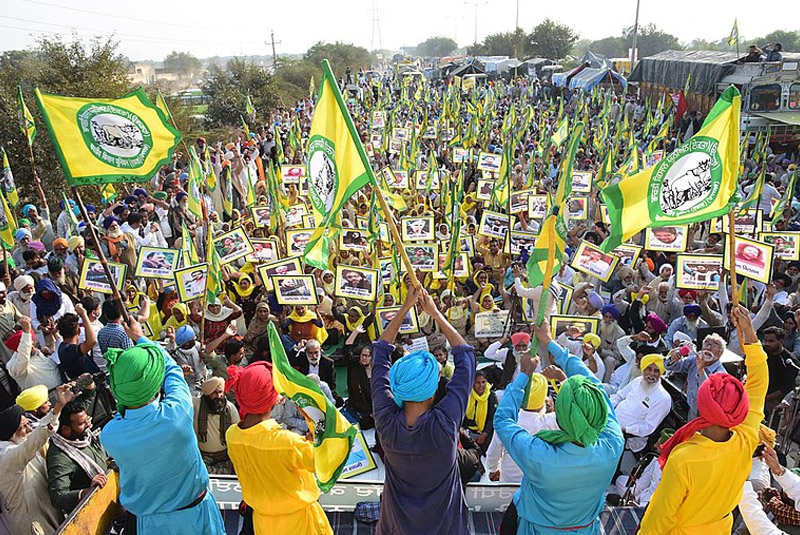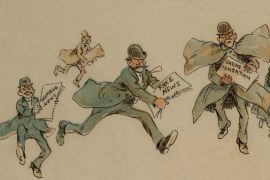No. This abrupt U-turn does not resemble a Waterloo. It is more like Napoleon’s disastrous Russian campaign that preceded the Waterloo by three years. The perhaps unexpected, but not necessarily inexplicable, U-turn by Prime Minister Narendra Modi, convinced of his infallibility, with his entourage not daring to tell him what he does not want to hear, raises a number of questions in the mind of the alert citizen.
She might look for answers in the mainstream media, print and television. She will be disappointed as a good part of the media, run for profit, desperately dependent on advertisements from a government that can easily intimidate them, if necessary, by unleashing the investigative agencies, do not dare to raise such questions.
Let’s start with a political parsing of the speech that marked the U-turn.
Our government brought in the new laws with good intent, full sincerity and complete dedication for the welfare of farmers, especially for small farmers, in the interest of agriculture and the country and for the bright future of the poor in villages. But we have not been able to explain to some farmers such a sacred thing, which is absolutely pure and for the benefit of the farmers, despite our efforts.
Questions:
- Are the farmers so lacking in intelligence that even after ministers explained to them–over a period of four months, in as many as 11 meetings–they could not understand the immense benefits that the Modi government wanted to bestow on them?
- Are the ministers lacking in articulation to put across the list of benefits? If the ministers are not articulate enough why didn’t Modi himself invite the farmers to his residence on Lok Kalyan Marg?
- Who drafted the laws, the law ministry? Did they seek inputs from outside the government? If so, from whom and why?
Obviously, any law should provide a fair arrangement for dispute settlement. In the case of these laws, the government is the final authority and the farmer cannot go to court. This provision flagrantly violates the doctrine of separation of powers, a pillar of the Indian constitution as well as of others in democratic countries.
There is one more atrocity that has not been highlighted by the government-friendly media:
No suit, prosecution or other legal proceedings shall lie against the Central Government or the State Government, or any officer of the Central Government or the State Government or any other person in respect of anything which is in good faith done or intended to be done under this Act or of any rules or orders made thereunder. – The Farmers’ Produce Trade And Commerce (Promotion And Facilitation) Act of 2020.
Was the portion granting immunity to “any other person” drafted by the law ministry, without inputs from the corporate lobby? Who decides whether the act is in “good faith”? Is there a similar provision in any other piece of legislation?
What was the need to proclaim an ordinance in June 2020, and why was the Union Parliament denied the chance to scrutinise the bills? Is it not an established convention that such important bills should be sent to a Select Committee for detailed examination?
This writer leaves it to the reader to figure out the answer, only pointing out that it is part of the style displayed in the case of the infamous demonetisation and the ill-starred lock down, apparently without any forethought or preparation.
As former minister P Chidambaram has asked, why was there no Cabinet discussion or decision before the U-turn was announced? At the time of writing, senior bureaucrats are burning the midnight oil to produce a cabinet note to justify the U-turn.
What has been the cost–political, economic, and social–of these hastily passed bills? Why is it that responsible bodies– such as FICCI or CII–have not yet thought of working out the economic cost?
Why did Modi wait for 670 farmers to die before making a U-turn? As Varun Gandhi, the BJP Member of Parliament urged the Prime Minister, how about paying Rs.1 crore to each of the bereaved families and sending them each a personal note of apology from the Prime Minister?
Let’s turn our attention to some related questions. The general consensus is that the U-turn was done to take care of the state elections in U.P. and Punjab. That is understandable. After all, politics, as practised in India, is all about capturing power and retaining it as long as possible by all means, fair or foul–fouler the better.
However, observers are not certain that the intended electoral benefits will follow. Of course, by taking the U-turn Modi may have stopped losing electoral ground. He is unlikely to regain the lost ground in Punjab or western Uttar Pradesh.
The public discourse on the farm laws, even in government-friendly print and television channels, has demonstrated the inability of the laws’ defenders to advance arguments that convince the alert citizen. A minister of state has said he could not understand why the laws are called black; only the ink is black, he claimed facetiously. However, the defenders should not be blamed as they were defending the indefensible.
We need to debate the merits and demerits of ‘Modi’fied India. In this context, dear reader, I do recommend Aakar Patel’s just published book The Price of the Modi Years.
The U-turn as pointed out earlier does not necessarily mark or forebode a Waterloo. But it is comparable to the Russian misadventure. It is for the alert citizen to decide whether to deliver a Waterloo in 2024 or not.
Three years separated the Russian disaster and the Waterloo. Who can look “into the seeds of time, and say which grain will grow and which will not?”
This story first appeared in The Citizen.
-30-
Copyright©Madras Courier, All Rights Reserved. You may share using our article tools. Please don't cut articles from madrascourier.com and redistribute by email, post to the web, mobile phone or social media.Please send in your feed back and comments to [email protected]











